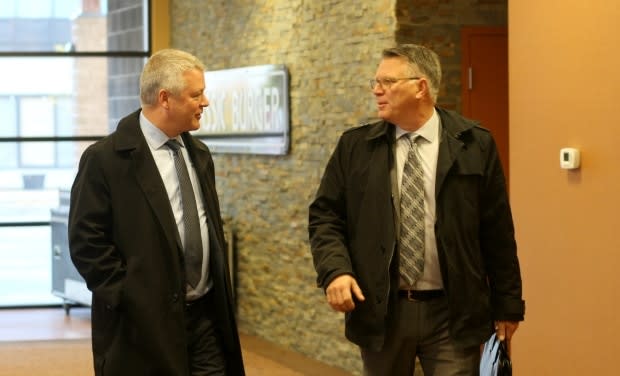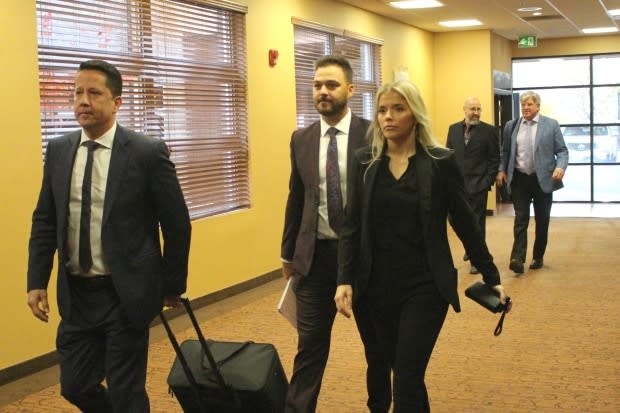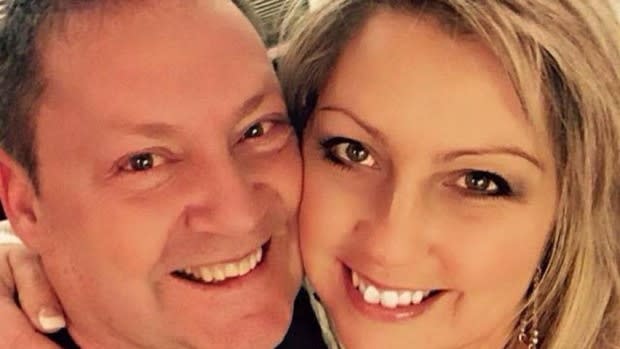'Fair' to say use of force in Bathurst shooting was appropriate, supervisor says
The supervisor of the Bathurst police officer who shot and killed Michel Vienneau in 2015 says it would be "fair" to say the officer's use of force was appropriate.
Insp. Ron DeSilva was the fifth witness to testify at a disciplinary hearing for Bathurst Police Force constables Mathieu Boudreau and Patrick Bulger.
T.J. Burke, the lawyer for Boudreau, led DeSilva under cross-examination through a series of questions about the use of force by police and when it's appropriate, such as when an officer's partner is under threat when hit by a car and run over by its wheel.
"It's possible," DeSilva replied.
Burke asked whether DeSilva was aware that the Serious Incident Response Team from Nova Scotia had been called in to investigate the officer's conduct and that a use of force report had determined that Boudreau's shooting was justified.
"I was aware from another member telling me," DeSilva said. "I didn't see the report."

Burke asked whether the use of force Boudreau used that day was appropriate.
"Based on what you're telling me today, I would say it was fair," DeSilva said.
DeSilva earlier testified Bulger and Boudreau took it upon themselves to surveil the Tracadie man as he arrived at the city's train station based on what turned out to be false Crime Stoppers tips.
But DeSilva said under cross-examination that the information was viewed as credible enough for the officers to go into the field to look into it.
Bulger and Boudreau were part of the six-member Northeast Integrated Intelligence Unit based in Bathurst supervised by DeSilva. The unit was dedicated to fighting organized crime and drug trafficking.
The first tip arrived by email from Crime Stoppers at about 9:52 a.m. on Jan. 12, 2015. It indicated two people were coming back on the train from Montreal that day with a "load of drugs."
A second, more detailed, tip followed shortly after that referred to pills. Vienneau and his fiancée Annick Basque were specifically named.

DeSilva testified he mentioned to Bulger "that he had missed a load of drugs" because the tip came in after the train was supposed to arrive in the city. Bulger shortly after said the train was delayed and had yet to arrive. DeSilva said Bulger and Boudreau prepared to head to the station.
DeSilva said basic searches of a police database were done to find a photo of Vienneau. DeSilva testified he told other members of the unit to help Boudreau and Bulger with surveillance when Vienneau and Basque got off the train. They left not long after, he said.
'It wasn't a far-fetched tip'
Burke asked whether he viewed the tip as credible.
"It wasn't a far-fetched tip," DeSilva said, telling the arbitration hearing that police had an informant who had talked about using the train to move drugs.
The tips turned out to be false.
DeSilva testified he wasn't aware of any planning or other preparation made by the members of his units once they left the office for the train station.
Basile Chiasson, the lawyer for the Bathurst police chief, asked DeSilva — as the boss of the unit — what his understanding was of what the officers were to do at the train station.
"To investigate the Crime Stoppers tip," DeSilva said.

Chiasson asked if they were going to arrest someone. DeSilva said that could happen as part of an investigation if they had the grounds to do so.
He also said the unit usually gathers intelligence, and the "tactical" action based on those tips would usually be done by one of the police forces that make up the unit.
Those forces included the RCMP, Miramichi police, Bathurst police and BNPP Regional Police Force.
Tactical activities are usually arrests or executing search warrants.
Earlier in the day, the fourth witness to testify at the hearing was a Via Rail worker.

"I saw it all," Wayne Coster, an engineer on a Via Rail train said, describing a commotion while walking along the train platform.
He looked over and saw a white car get cut off by another vehicle. Coster said it appeared the car attempted to make a 360-degree turn.
It hit the snowbank "at full force" without brake lights. Coster testified he then saw a man in plain clothes running.
"Without any hesitation, he came up along the car and shot out the back driver's side window," Coster said. He heard the person then yell "get out of the car, get out of the car."
Burke, the lawyer for Boudreau, asked Coster during cross-examination if he heard anything about the white car hitting an officer and running him over.
"I didn't see anything like that," Coster said, prompting Burke to say other witnesses testified at earlier proceedings that they saw that and are expected to say that again at the arbitration hearing.
'A mechanism of self-defence'
DeSilva and Coster were among 17 witnesses expected to testify.
Burke told reporters on Thursday that the public had yet to fully hear what happened that day.
"Today I think we tried to paint the picture that it wasn't just two rogue police officers that went in there shooting guns," Burke said. "There was a mechanism of self-defence."
None of the witnesses who have testified so far have said they saw Bulger being hit or run over by Vienneau's car. One witness testified Thursday that it appeared a man was trying to get away from the white car.

Basque, the first witness called this week, said she didn't know the two were police officers when they tried to stop Vienneau.
The officers are suspended with pay from the force.
Lawyer Joël Michaud is the appointed arbitrator for the hearing and will decide what punishment the officers may face. The Bathurst police chief has recommended they be fired as a result of their actions around the shooting.
The hearing is scheduled to run until Oct. 25.


